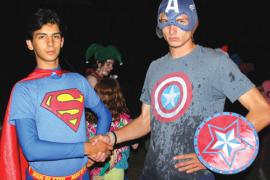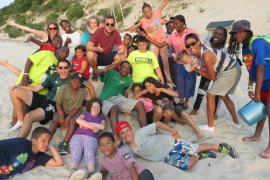With Mark Victor Hansen, author, philanthropist, entrepreneur, and co creator of Chicken Soup for the Soul, tells how and why the stories of our lives can be motivators for change in every area from personal transformation to corporate management and fund development. With warm-hearted wisdom, wit, and creativity, he shares insights in an engaging interview with Camping Magazine, in which his experiences as a visionary thinker link us to the great possibilities of our own human potential.
What was your inspiration behind the Chicken Soup for the Soul series of books ? What sparked this idea?
First of all, you are born telling stories; it's natural. You are your own story. That's one level . The next level is to recognize that the art of storytelling is ancient. Stories became written about 5,000 to 6,000 years ago. My business partner Jack Canfield and I have been best friends for many years now. We first began to write and tell stories to audiences years ago. We kept getting standing ovations for the stories we finished and talked about. We asked ourselves, why don't we do a book of our talks that we get standing ovations for — a book that reaches people's spiritual lives, helps them make new decisions, and helps them make a lasting difference? That's what we did and that's where it started and now 204 books later, in 41 languages, and with 157 million sold, it's working at a level that we didn't have any clue that it could work in. Rather than read horror stories, people should go and read stories like ours and feel inspired and go out and do new wonders!
You have a wonderful, philanthropic commitment — how do you motivate others to join you?
Giving is intrinsic to our souls. I wrote a book, The Miracle of Tithing, which explains the miracles of giving and why people have to give.
In essence, when the American Red Cross was out of blood, and we were doing the third helping of Chicken Soup for the Soul, one of my friends from the Red Cross said, "Mark, you always come up with great ideas, how do you get people to give? We are out of blood; you know we need 38,000 pints a day." So, I said, "I'll go where no one else has gone." And, I began to look at the chiropractic market, which is one of seven marketplaces I work with. They are really good people. I said, "Look everybody, there are 62,000 of you, we want you to give 100 free adjustments for your clients who give blood. Bring in the blood mobile." It worked. We went from dehydrated to re-hydrated because of one idea. It is one person, times an idea, that equals an outcome. That's the point of fund raising in that case. It's always one person, times a colossal idea, and what happens is people want to revolve around the idea — the bigger, the better. Tell them the facts: "We are out of blood and you or your loved ones are going to die if there's no blood at the hospital when you get there."
Use a powerful story; it's always a good idea if you are trying to raise money. I can do a lot of dramatic stories. One of my partners who writes financial books with me recently crashed his car into a tree going eighty miles an hour; basically, the airbag saved his life, but he needed fifteen pints of blood to survive. Only 2 percent of the population is giving blood. No one wants to give blood, myself included. What I would say to this particular fund-raising audience is if you don't give any blood, when you or loved ones get to the hospital, you don't deserve to get it. Remember, it's an idea, plus a story that gets a result. It's a big idea times an individual that has what you need that gives you the outcome you need.
Working with children is a wonderfully, rewarding avocation, but it's not easy. There are children at risk, with special needs, problems at home, or simply dealing with overwhelming expectations from parents. How do you motivate and re-energize leaders of, and mentors to, youth?
It's going to sound like I have a vested interest, but the fact of the matter is they really need to be reading out loud, or having the campers read stories out loud. They can be your stories, or our stories. I think our stories are safe and neutral, always uplifting and optimistic.
People aren't sharing enough stories. In other words, what we are saying now and what I'm teaching in the seminars is, you've got to turn off the televi sion and tell a vision. Let's say you are reading Chicken Soup 1 out loud to your campers around the campfire. You read the story of the world's greatest camper, who's a real Indiana Jones, Dr. John Goddard, he's a close dear friend of mine. He set 127 goals for himself when he was fifteen. Now, let your campers start setting their own goals. Ask the campers, what is their vision? Each camper around the campfire can share his/her vision: My vision is to graduate high school. My vision is to go to college. My vision is to be a medical doctor. My vision is to own a garbage dump, whatever the heck it is, I don't care what their vision is. My vision is to date Janie or Sam, whatever. Right? But, that kind of stuff is not done anymore. What's happening is we're having a tremendous amount of over-communication but not enough intercommunication. We are all drowning in information, but we are not really talking to each other.
What are the qualities in leaders you find most important in developing the human potential of others?
The most important quality is unequivocally . . . vision. The richest man of all time, Solomon says without it you perish, with it you flourish. We are in a really exciting time. The media is only spending all it's time showing the breakdown of leaders, but as a leader, I'm showing what breakthrough can be. I happen to be having a meeting with top leaders right here in my office in a short time, and we are calling this a meeting of the leaders of influence. We are trying to define what a leader is going to look like in the future at levels that nobody's ever considered, because we are now in a different future. There's a big paradigm shift, a conscious idea shift. The buggy whip is gone, and the automobile is here. Well, the automobile got us out of the depression.
We need leaders who are more visionary and thoughtful than they have ever been before, because for the first time we are in a leadership position and billions of people are depending on the leaders, and the leaders aren't coming up to the plate very well.
How do camp experiences make a difference in the lives of children, youth, and adults?
Camp experiences get you absolutely in tune with yourself. I define success as the difference between where you are and the utilization of your full potential. Camp teaches you life lessons at a very vital level, as far as I'm concerned. And I love the whole idea. I think everybody should have a camp experience – at least a week a year – everybody, whether it's a week at family camp, or the children go to camp.
At camp, you're in a unique place. During this time at camp in the outdoors when you are supposed to commune with nature and watch the star show at night, it is a sacred time that we need more of not less of.
I do wax on poetically, but I understand the camp experience and getting outdoors. I have climbed some of the highest mountains in America, including Mount Whitney, so I understand the benefits of being outdoors. I can tell you when I was at Whitney, I had fifty-eight people with me, and a couple of people didn't make it all the way to the top, and I can also tell you when the moon was out at night on the mountain, it was a little chilly, but it was like sunlight during the middle of the day. Everyone on that trip got to see the most spectacular view of the night sky, because there was no light pollution. The view and the risks you take to get there excites you at such a level that you begin to remember who you are as a human being. So many people are so citified, they don't remember who they are as human beings. That's why what you are doing is noble, important, and creative.
I think everybody needs a camp experience, just based on the raw psychological data that says most people don't get out in the greenery enough. Greenery centers you and makes you healthy.
It seems the keywords possibility, opportunity, and action are recurring themes in your work. How would you relate these principles to the impact camp has on children? What possibilities, opportunities, and action does camp inspire among campers and staff?
Camp gives more possibilities at every level. It inspires you because you have a level of leadership that is different than what you get in elementary or junior high school or college. You are learning from someone in the outdoors. A camper won't be learning from a football coach or a cheerleading coach; they will be learning from a camp coach who will teach campers "stuff" that maybe they have never thought of before.
The opportunity that camp gives is independence — that child is away from "mom and dad." That child could cry, "Oh poor me ain't it awful!" "I'm lonely!" Or they could say, "Wow, I am growing up. I'm a real grownup. This is going to be an opportunity of a lifetime." "I'm going to astonish myself and show myself that I can handle it."
As for action, camp promotes action in all of its activities; it propels campers to take action they never expected.
If you were addressing a group of camp counselors and youth leaders at a local camp, how would you engage them in thinking about the power of "change"? And, why is "change" important?
Change is the only thing that is. I mean you don't look like you did when you were two years old; you are bigger, better, stronger, and intellectually richer and deeper, and you have made a lot of good decisions. When you have a real mentor as a camp leader of leaders, she/he gets campers to grow, and there is no subject in the world that's not interesting. I hope campers today have such great camp experiences that they want camp for the rest of their lives, and they will want it for their kids. It's a great opportunity that I've experienced and my kids have experienced.
Originally published in the 2010 January/February issue of Camping Magazine.


